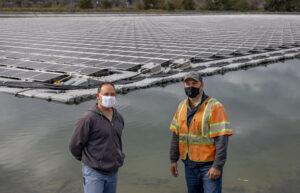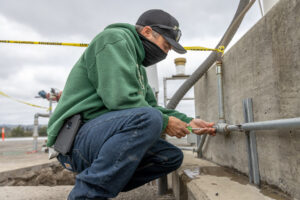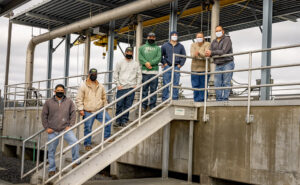Thanks to the hard work of IBEW members, the City of Healdsburg is now home to the biggest floating solar farm in the nation, a project that is being heralded as a win-win-win for the utility, the community, and the environment.
“The floating solar array provides shade for storing our recycled water, which is a benefit for water quality, because it keeps algae from growing and keeps the water quality high for our agricultural customers,” explained IBEW 1245 member David Hambly, who works as a wastewater operations foreman at the City of Healdsburg. “It also moves us closer to our goal for generating more green power, and it’s generated locally. It’s a benefit for the citizens, it’s a benefit for the water utility, and it’s a benefit for the electric utility.”

City of Healdsburg Water Operations Foreman David Hambly, (left), and Electric Coordinator/Inspector Paul McQuaid at the floating solar array in Healdsburg, CA
The 4.78 megawatt solar array covers roughly half of Healdsburg’s two recycled-water treatment ponds. It is made up of 11,500 bi-facial solar panels, and each panel can produce 410 watts. When the sun hits the panels, it releases electrons that are collected and sent into a series of 20 inverters, which convert the DC electric to AC electric before distributing the power out to customers. According to the City, the array provides eight percent of Healdsburg’s total energy needs.
In January, the installation was completed with support from IBEW Local 551 wiremen, and the maintenance is now being managed by IBEW 1245 utility operators that work for the City of Healdsburg.
“As the water utility, our part will be to continue working with the maintenance contractor, PVCA, to maintain pond level so that they can float the panels around,” Hambly said. “The array was designed to be separated and moved in parts so that we can do our annual inspections on the liners for our ponds.”
And of course, the electric utility has been involved in the project as well.
“The electric department’s job was to get power from point A to point B. During that process, we had to bring power from overhead to underground to a vault, and from a vault over to the switchgear,” explained IBEW 1245 member Paul McQuaid, electric coordinator and field inspector for the City of Healdsburg.

City of Healdsburg Industrial Electrician Derek Sheets works on a conduit at the Water Reclamation Facility
The crew experienced a minor setback when a trench failed, but the issue was quickly resolved with a concrete bridge to accommodate the heavy traffic that comes through the area. The rest of the project went ahead smoothly.
“It was about a week’s worth of work building the riser and the overhead and then bringing the underground over, splicing, tying everything in, making sure that the CTs and the PTs were tied in and working,” said McQuaid. “Our crew was willing to go above and beyond, making sure that we had everything working by a certain date because that was our deadline. The guys made the sacrifices, worked late the day before Christmas.”
Utility work is a 24/7/365 job – but for Hambly, the essential nature of his work keeps him on his toes.
“We work through everything. We work through floods, we work through fires, we work through evacuations, we work through pandemics,” he said. “It never stops. As we say out here [in wastewater operations], people never stopped flushing. There’s always stuff to do, which is great.”
Hambly appreciates having IBEW 1245 in his corner.

IBEW members at the City of Healdsburg Water Reclamation Facility, from left: Utility Operator Al Ochoa, Industrial Mechanic Dustin Hughes, Instrument Technician Ron Green, Industrial Electrician Derek Sheets, Industrial Mechanic Stephen Nelson, Lab Analyst Angie Koski, and Wastewater Operations Foreman David Hambly
“The union is always going to bat on behalf of the workers with the city. When I first started here, I didn’t have a good understanding of that. But a former shop steward told me that employers aren’t going to give us stuff out of the goodness of their heart — and I can imagine that’s true in the private sector as well,” he said. “They’re in business to make a profit and they should be — but we’ve got the union going to bat for us, for our wages and benefits, and we have someone to represent us when it’s time to negotiate, so we don’t have to do that on our own.”
“It’s not just the workers that are the beneficiaries — the city actually benefits too,” he added, “because the union makes happier workers, and happier workers get more done. They work harder.”
Photos by John Storey